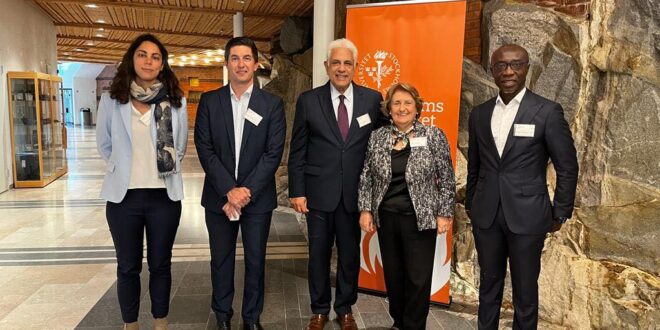Dr. Hossam Badrawi is attending an important conference at the University of Stockholm, the capital of Sweden, for the Magna Charta ambassadors of living values of education in universities, which is a project to integrate the six values adopted by the Bologna process in higher education in the conscience of university management, faculty members, students and workers to create A better university community:
1- Integrity;
2- Justice and fairness;
3- Creativity, innovation and excellence.
4- Social responsibility and community service;
5- Diversity, pluralism, and inclusiveness, 6- Health, well-being, and a community of solidarity.
Noting that the principles of the Bologna Declaration to which universities adhere include the following basic principles:
1. That the university is an independent institution in the heart of societies; It produces, examines, evaluates and disseminates culture by means of research and education, to meet the needs of the world around it, and its research education must be morally and intellectually independent of all political or economic power.
2. The foundation of the university’s existence is freedom in research and training. These are the basic principles of university life, and governments and universities, each individually, must ensure that this basic requirement is respected, while rejecting intolerance and always being open to dialogue.
The university is an ideal meeting place for teachers who are able to transfer and produce knowledge, and that their knowledge is well-equipped to develop research and innovation, and to create an atmosphere that enables students to qualify for life, and to prepare them to be able to enrich their minds and souls with this knowledge.
It is the university’s continuing goal to achieve, transfer and disseminate global knowledge; To achieve its mission, it transcends geographical and political boundaries, emphasizing the vital need for different cultures and knowledge to influence one another.
Dr. Hossam Badrawi published an important research paper with Dr. Andrea Balban from Switzerland entitled “Universities: Civilization Makers or Educational Service Providers” in which he indicated that the university should meet four goals, namely “achieving well-being, order, meaning and the search for truth” and ending it with the words of Dr. Taha Hussein about universities, which he wrote in his valuable book “The Future of Culture in Egypt”, in which he says:
“The university does not form the world alone, but rather the cultured and civilized man is formed in it, for whom it is not enough to be educated, rather it is important for him to be a source of culture, and it is not sufficient for him to be civilized, but rather for him to be a developer of civilization. From these two characteristics, it is not worthy of being a university, rather it is a modest school among the humble schools.
And who would like to read the article d. Badrawi is available on the following link:
https://www.hossambadrawi.com/wp-content/uploads/2022/06/5_builders-civilization.pdf
1- Integrity;
2- Justice and fairness;
3- Creativity, innovation and excellence.
4- Social responsibility and community service;
5- Diversity, pluralism, and inclusiveness, 6- Health, well-being, and a community of solidarity.
Noting that the principles of the Bologna Declaration to which universities adhere include the following basic principles:
1. That the university is an independent institution in the heart of societies; It produces, examines, evaluates and disseminates culture by means of research and education, to meet the needs of the world around it, and its research education must be morally and intellectually independent of all political or economic power.
2. The foundation of the university’s existence is freedom in research and training. These are the basic principles of university life, and governments and universities, each individually, must ensure that this basic requirement is respected, while rejecting intolerance and always being open to dialogue.
The university is an ideal meeting place for teachers who are able to transfer and produce knowledge, and that their knowledge is well-equipped to develop research and innovation, and to create an atmosphere that enables students to qualify for life, and to prepare them to be able to enrich their minds and souls with this knowledge.
It is the university’s continuing goal to achieve, transfer and disseminate global knowledge; To achieve its mission, it transcends geographical and political boundaries, emphasizing the vital need for different cultures and knowledge to influence one another.
Dr. Hossam Badrawi published an important research paper with Dr. Andrea Balban from Switzerland entitled “Universities: Civilization Makers or Educational Service Providers” in which he indicated that the university should meet four goals, namely “achieving well-being, order, meaning and the search for truth” and ending it with the words of Dr. Taha Hussein about universities, which he wrote in his valuable book “The Future of Culture in Egypt”, in which he says:
“The university does not form the world alone, but rather the cultured and civilized man is formed in it, for whom it is not enough to be educated, rather it is important for him to be a source of culture, and it is not sufficient for him to be civilized, but rather for him to be a developer of civilization. From these two characteristics, it is not worthy of being a university, rather it is a modest school among the humble schools.
And who would like to read the article d. Badrawi is available on the following link:
https://www.hossambadrawi.com/wp-content/uploads/2022/06/5_builders-civilization.pdf
 Dr. Hossam Badrawi Official Website
Dr. Hossam Badrawi Official Website


